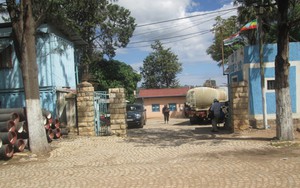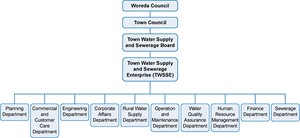How water utilities are structured
Water utilities are part of the organisational structure for water supply in towns and cities. In Ethiopia each woreda has a Council, and each town in the woreda has its own Town Council. Under each Town Council there is a Town Water Board, and under it is the water utility, which may also be termed the Town Water Supply Enterprise. In some towns the water utility is also responsible for the collection and disposal of sewage, in which case it is referred to as the Town Water Supply and Sewerage Enterprise (Figure 6.1) and reports to the Town Water Supply and Sewerage Board. The water utilities have a duty to provide the water supply (and sewerage services) promptly, at appropriate cost, and with a high quality.

Figure 6.1 The offices of the Harar Water Supply and Sewerage Enterprise.
The Town Water Board is a committee made up of individuals who are specialists in water treatment and supply, representatives of other sector offices such as Health and Education, and other stakeholders (in this context, representatives of people who would be affected by the water utility’s actions). Importantly, two members of the Board are democratically elected community representatives. At least one of these has to be a woman. The term of office of the Board members is five years. The function of the Board is to ensure the effective performance of the water utility. In particular it is responsible for ensuring that the water delivered to the public conforms to quality standards. The Board is also responsible for determining the utility’s vision, mission, aims, objectives and values, together with approval and monitoring of the utility’s budget and work programme, recruitment of the utility’s General Manager, and approval of appointment of Heads of Department.
A water utility may have several departments (Figure 6.2):
- The Planning Department plans for the growth in services provided.
- The Commercial and Customer Care Department handles queries and complaints from commercial and domestic customers.
- The Engineering Department is responsible for major engineering works, such as refurbishment or expansion of facilities.
- The Corporate Affairs Department takes care of public relations and communications such as publicity campaigns to encourage efficient use of water.
- The Rural Water Supply Department ensures that water supply is extended to cover the rural population.
- The Operation and Maintenance Department ensures the smooth running of the water treatment and supply system.
- The Water Quality Assurance Department monitors the quality of delivered water to ensure that it is up to standard.
- The Human Resource Management Department looks after the recruitment and training of staff.
- The Finance Department manages the water utility’s budget and makes sure that all financial transactions are recorded, and that revenue is collected for water supplied.
- Finally, if relevant, the Sewerage Department looks after the sewer network and sewage treatment. (Note that sewage is the water-carried faecal waste from toilets, sewers are the pipes carrying this waste and sewerage refers to the infrastructure that conveys sewage. It encompasses components such as receiving drains, manholes, pumping stations and screens.)

Figure 6.2 The organisational structure for urban water supply in Ethiopia.
While all the above departments are important, an effective and efficient Operation and Maintenance Department is vital to ensure that people receive good-quality water continuously each day. This function will be the focus of the next section.